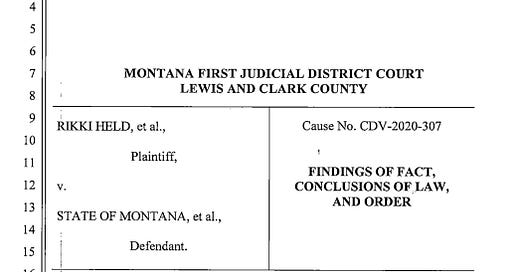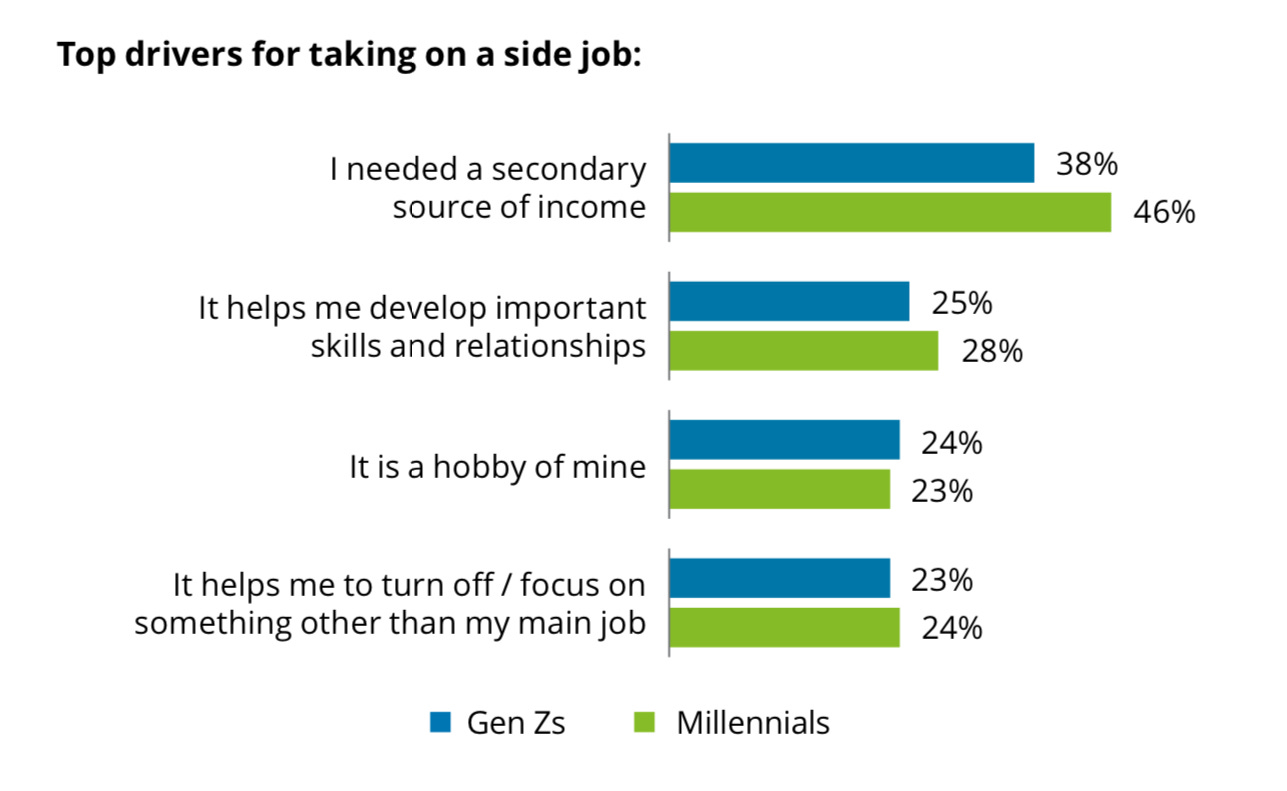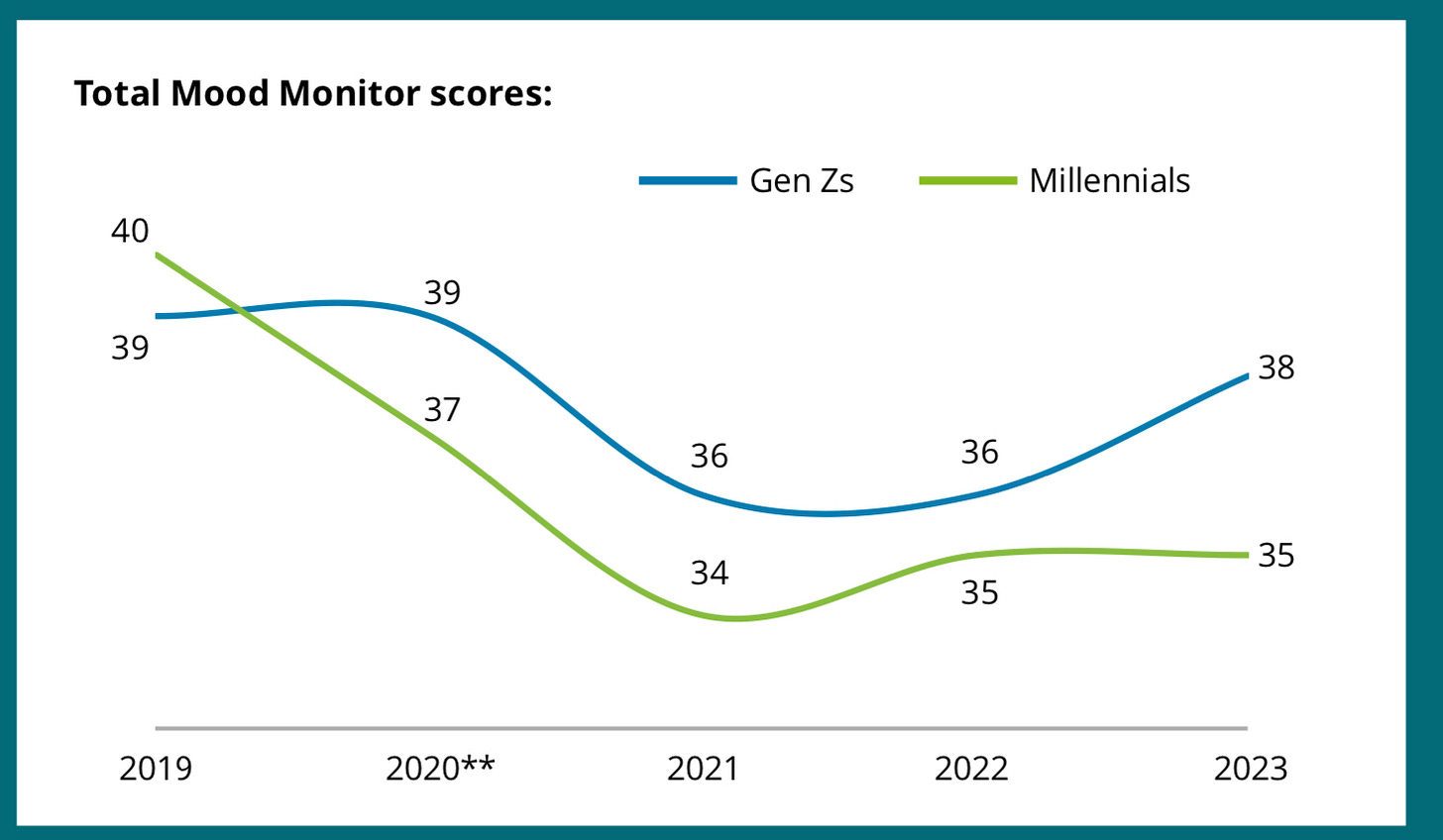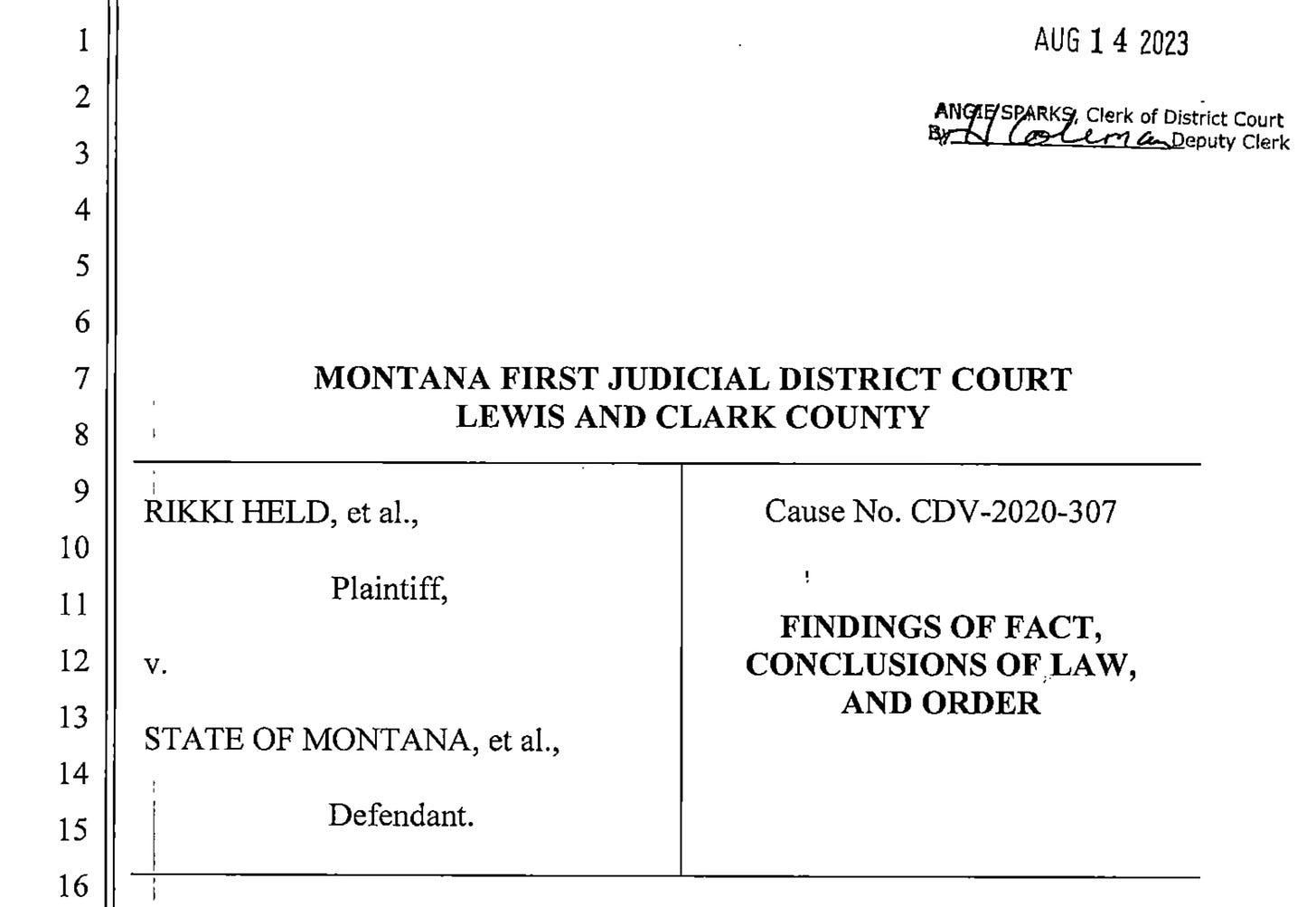15 August 2023. Generations | Climate
Gen Z and Millennials aren’t particularly happy workers // It’s a first: young people win a climate case against an American state. [#487]
Welcome to Just Two Things, which I try to publish three days a week. Some links may also appear on my blog from time to time. Links to the main articles are in cross-heads as well as the story. A reminder that if you don’t see Just Two Things in your inbox, it might have been routed to your spam filter. Comments are open.
1: Gen Z and Millennials aren’t particularly happy workers
Deloitte has published its 2023 Gen Z and Millennial Survey, now in its 12th year. Suspicion always kicks in when I see a big research report from one of the global management consultancies, as the question, “What are they trying to sell?” Is always in the air.
On the other hand, very few organisations can afford to survey 22,000 respondents across 44 countries, so let’s just take it at face value. Fieldwork was conducted at the end of 2022, and qualitative research was done in March 2023. There are 14,483 Gen Zs and 8,373 millennials in the sample.
The report’s authors have decided that we’re now far enough away from the pandemic to compare this year’s outcomes with the data from the last year before the pandemic. I’m not quite sure about the validity of this. The oldest Gen Zs are—on Deloitte’s definition1—are 28 this year, and would have been 24 or less, and barely in work in 2019, so even if the samples are of comparable size, their position in the workplace would have been much less secure.
However, Deloitte’s general conclusion is that—from the perspective of Millennials and Gen X—things have improved over that time:
(W)e found that Gen Zs and millennials are now more likely to be satisfied with their work/life balance. They feel they have more flexibility in where they work. They believe their employers have made progress in driving greater diversity, equity, and inclusion (DEI). And they are slightly more likely to believe that businesses are taking action to address climate change.2
Some of this has had little to do with employers, they note, and some of it was caused by the temporary shift in power towards employees in the wake of the pandemic.
And it’s always best to start with the good news, because the bad news is pretty bad:
(A) cost-of-living crisis spurred by the largest surge in inflation in 40 years, the biggest land war in Europe since the 1940s, rising mental health challenges and burnout, and an increase in physical health issues resulting from a lack of preventative care, among other factors.
And it turns out that “(t)hese issues weigh heavily on Gen Z and millennial respondents”. Really.
It’s quite a chunky report, so I’m just going to pick out a few things that jump out.
Here’s the 2019/2023 comparison chart that shows that GenZs and Millennials think that things at work are on the up.
(Source: Deloitte, 2023 Gen Z and Millennial Survey)
It’s unarguable that these data points have headed up over the last four years. But none of these are great numbers. Yes, they are measuring “Very satisfied” and “strongly agree”, but all the same the highest number here is 34%. And at the right hand end, they definitely are not impressed with their employers’ responses to climate change.
Because the data suggest that they are doing more than their employers are on climate change, or are trying to.
(Source: Deloitte, 2023 Gen Z and Millennial Survey)
And of course, people who look at more research data than I do these days might think there’s a little bit of overclaiming here. All the same, I was struck by the data on driving a car, fast fashion, and vegan/vegetarian diets.
Somewhere in the report, there’s a data point about how many Gen Zs and Millennials do more than one job. It’s high:
“46% of Gen Zs and 37% of millennials have taken on either a part- or full-time paying job in addition to their primary job.”.
Year on year, this is a three percentage point increase for GenZs and four percentage points for Millennials. More than half of both groups say they live from paycheck to paycheck, up five percentage points year on year for both groups:
(Source: Deloitte, 2023 Gen Z and Millennial Survey)
There are other things in here that are also notable. From the executive summary, almost half of GenZs and two-fifths of Millennials say “they feel stressed or anxious at work all or most of the time”. The reasons include finances, the health and wellbeing of their families, and workplace factors.
More than three-fifths of GenZs, and almost half of Millennials, say that have experienced harassment or micro-aggressions at work in the last 12 months.
They’re interested in working less, although generally don’t think it would be feasible, either because their actual workload wouldn’t fall, or because they wouldn’t be able to manage on a lower income. They’re also enthusiastic about remote work.
No report like this is complete without “key takeaways” for managers, as if these make any difference to the world. But I’ll list the headings here just in case:
Accelerate progress (on improving workplace conditions)
Confront financial concerns
Enable flexibility, in where—and when—people work
Contend with the drivers of stress and anxiety and eliminate the mental health stigma
Address non-inclusive behaviors
Prepare for the transition to a low-carbon economy
On this last point, the report estimates that 800 million jobs worldwide are “highly vulnerable” to climate change.
My own takeaway from all of this is that the workplace isn’t really working. Young people aren’t paid enough, they experience harassment at work, and in exchange they are highly stressed, to the point where a significant minority report feelings of burnout. And on top of that, there’s a significant values gap between what the employers are doing about climate change and what their younger employees think they should be doing. This isn’t sustainable, in multiple senses of the word.
Finally, right at the end, there’s a chart I’d have been embarrassed to include. This is the Deloitte Mood Monitor, which they have been running over five years, which measures the proportion of positive answers to a suite of outlook questions.
(Source: Deloitte, 2023 Gen Z and Millennial Survey)
It looks quite good, at least for GenZ. Until you (a) realise that this means over five years there have never been more than two fifths of respondents anwering positively; and (b) look at the actual numbers and realise that for GenZ these scores have barely changed over five years, and that for Millennials they went down and then got stuck. The changes since 2021 are likely within the margin of error.
2: It’s a first: young people win a climate case against an American state. For now.
To general surprise, the young people who sued the state of Montana over climate change have won their case. It’s a big moment, because although youth-led climate actions have been filed in every US state, it was the first case of its kind in the US to be allowed to go to court.
I’m sure there will be a lot more commentary on this over the next few days, but Vox updated their preview of the court case with a brief summary of the ruling:
The decision reads, in part: “Montana’s (greenhouse gas emissions) and climate change have proven to be a substantial factor in causing climate impacts to Montana’s environment and harm and injury to the Youth Plaintiffs.”
And one of the effects of this is to bring climate change impacts back into consideration when assessing energy projects:
Prior to the ruling, the state government was not permitted to consider the impact of climate change when approving energy projects, but now that process will likely change. The judge also ruled that a change to MEPA (Montana Environmental Policy Act) earlier this year made by the state legislature is unconstitutional.
All of which seems a good moment to insert a compilation of “blasted kids/ meddling kids” quotes from Scooby-doo, doubtless playing on repeat right now in the Montana State capital.
Going back to the original Vox article, the grounds for the case are the Montana constitution, which says:
“The state and each person shall maintain and improve a clean and healthful environment in Montana for present and future generations.”
The 16 young plaintiffs argued that the state’s continuing support of the fossil fuel industry violated their right to a clean and healthful environment.
The State Attorney-General was aggressively dismissive of the case when it was brought, describing it as a publicity stunt that exploited well-intentioned kids:
Following the legislative session, there are no existing laws or policies for the district court to rule on. A show trial on laws that do not exist, as the district court seems intent on holding, would be a colossal waste of taxpayer resources.
Montana has the biggest coal reserves in the United States, and is a major coal exporter. But a significant part of its economy is driven by outdoor recreation and tourism.
It may also be relevant that both the Houses in the Montana Congress are currently controlled by a “super-majority” of Republicans, meaning that they can over-ride the Governor’s veto.
The Vox article is mostly a transcript of a podcast interview with Amanda Eggert, who is the environment reporter for the Montana Free Press. Pulling out a couple of clips from the interview, Eggert was, back in June, a little surprised that Judge Kathy Seeley, who made the ruling, had allowed the case to proceed.
Other cases had been proposed in other states, and dismissed. But there are maybe some lessons here for climate campaigners, apart from persistence.
The first is just making sure that the plaintiffs have “standing”:
(S)tanding is a legal concept, essentially establishing that the plaintiffs have demonstrable harms and that there are remedial actions that can be taken to correct those harms. And she also recognized that the state’s energy policies do have a direct bearing on those harms.
The second was the level of care that went into establishing the record of those harms:
I’ve spoken with one of the lead attorneys for the plaintiffs, and I know that they took great care to establish a whole record. Their initial complaint is over 100 pages, which is huge by legal standards.
And, related, the third is that the plaintiffs established that they had experienced individual harms, and that those harms related to climate change:
So there are plaintiffs that talk about being evacuated due to forest fires or plaintiffs who talk about grieving the loss of glaciers in Glacier National Park. There are plaintiffs who talk about concerns related to wildlife. And in addition to establishing those very specific harms, the plaintiffs also went to great lengths to demonstrate that climate change is happening, that climate change is happening in Montana, and that the state has been extremely permissive in its permitting of fossil fuel extraction.
And it may not have helped the state’s case that apart from challenging the standing of the plaintiffs they also argued that climate change wasn’t man-made.
There was also a piece in Inside Climate News in June that profiled some of the young plaintiffs. The ranch on which the lead plaintiff, Rikki Held, lives, has been directly affected by fires and floods:
wildfires and floods increasingly threaten the family’s 7,000 acres, which lie 20 miles outside Broadus, population 450. In many ways, Rikki is what everyone imagines a Montanan to be. She started riding horses and moving cattle when she was four. But she’s also a recent college graduate, trying to understand her place in the world.
The Climate News piece also mentions the lawyers acting for the young plaintiffs, a specialist non-profit firm called Our Children’s Trust:
OCT works to identify effective legal strategies and to represent young people who want to participate as plaintiffs. They partner with local youth organizations, give presentations in schools and assemble legal teams... OCT conducts a rigorous onboarding process to ensure young people know what it means to be a plaintiff, understand the commitment involved and are not feeling pressured to be involved, (OCT’s) Bellinger says.
The attorneys then identify the applicants whose lives best support the lawsuit and work with them to draft a legal complaint in which the plaintiffs describe their lives and the ways climate change has and will harm them... OCT supplies scientific and legal reasoning.
Reading between the lines of the Vox piece, it seems possible that Judge Seeley allowed the case to proceed because she thought that legislation that seemed to be designed to amend the Montana Constitution (or undermine it) should at least be tested in court.
The full 100-page judgment is here. Skimming through it this evening, the judge is pretty clear that climate change is caused by humans, that the State of Montana has contributed to that through its actions, and that young people in general, and the plaintiffs specifically, have been affected by adverse climate change effects.
Of course, this is only the beginning of the legal process. The case will likely now work its way up to the Montana Supreme Court.
j2t#487
If you are enjoying Just Two Things, please do send it on to a friend or colleague.
“As defined in the study, Gen Z respondents were born between January 1995 and December 2004, and millennial respondents were born between January 1983 and December 1994.” The typical definition of Millennials is that they are born between 1980 and 1996, of Gen Z born in or after 1997. The rationale for the Deloitte definition isn’t clear.
I’ll just add here my usual complaint about the way in which “work” is always added to “life” when it comes to “balance”. We don’t talk about “sleep/life” balance, for example. It should just be “life balance”.







